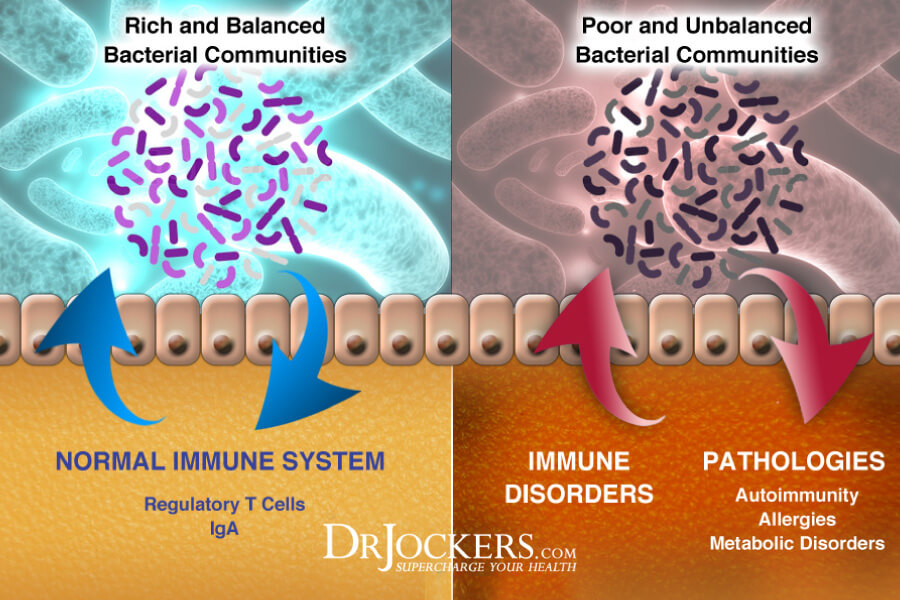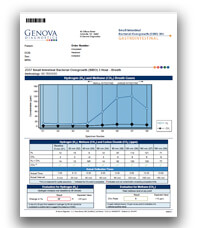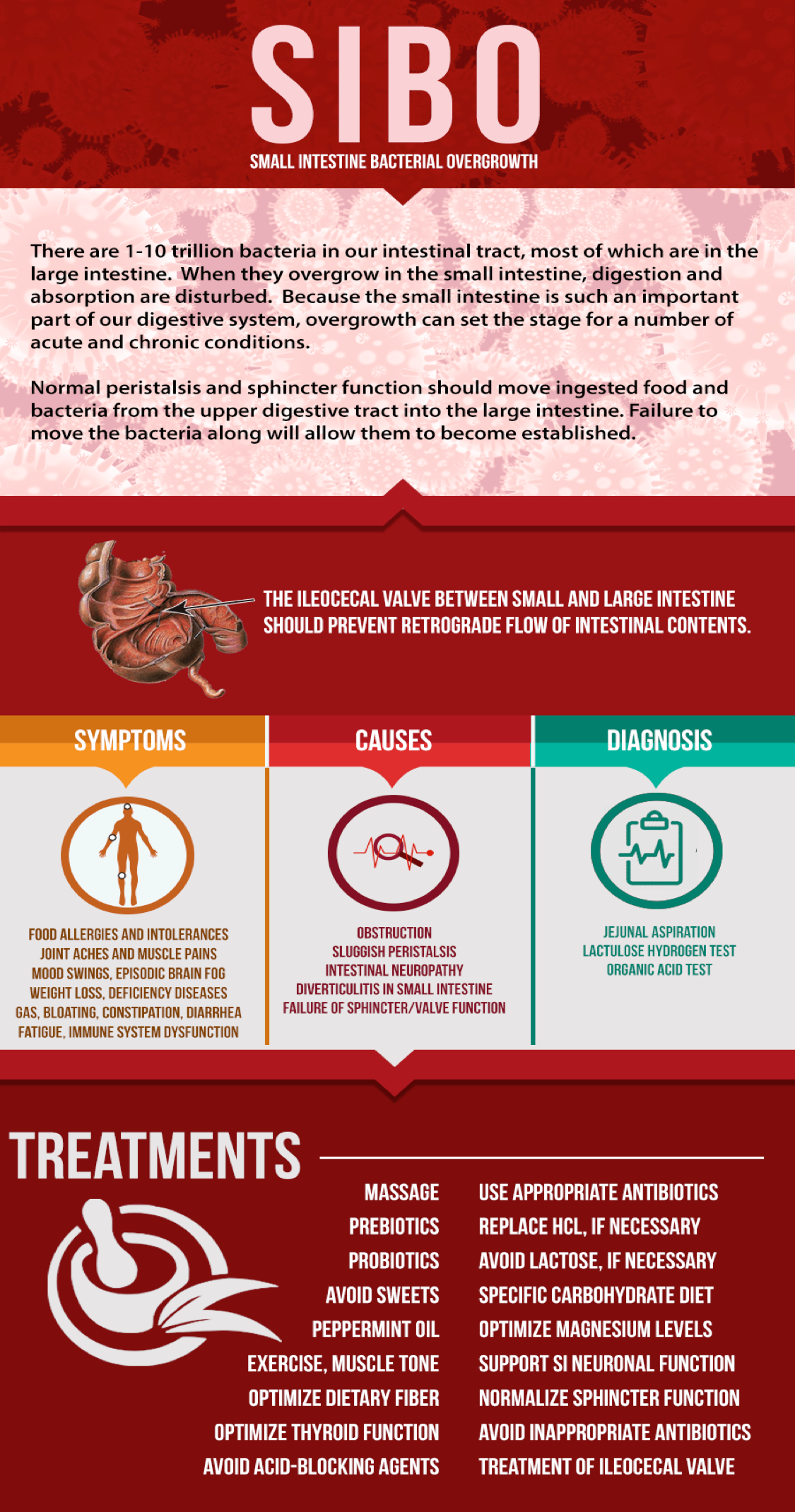![]()

SIBO (Small Intestinal Bacterial Overgrowth) is a condition in which abnormally large numbers of bacteria – the types that are normally found in the large intestine – are present in the small intestine.
When not functioning properly, the migrating motor complex (MMC) fails to effectively sweep intestinal contents into the colon during periods of fasting. Once in the small intestine these bacteria proliferate and feed off carbohydrates from food, creating fermentation gases, specifically methane and hydrogen.
It can be a cause of many health problems, including diarrhea, abdominal pain, and protein/fat malabsorption. In recent years, there has been renewed interest in SIBO since it has now been implicated in the pathophysiology of certain diseases previously not classically associated with overgrowth.
The World Journal of Gastroenterology claims a definitive association between irritable bowel syndrome (IBS) and SIBO, suggesting that SIBO be excluded before diagnosing a patient with IBS.

The Hydrogen/Methane breath test is a reliable and convenient method to help in assessing and classifying dysbiosis and SIBO.
This SIBO Breath Test is Made Up of the Following:
- Non-invasive breath collection
- Lactulose challenge to detect bacterial overgrowth in the distal small intestine
- 3-hour collection method reveals SIBO in patients with slow transit times
- Convenient interpretive guidance right on the test result
- Complementary interpretative support available from experienced clinicians
What Does This Test Measure?
Hydrogen – Bacteria produce hydrogen through the process of fermentation of unabsorbed carbohydrates. A small amount of hydrogen is normally produced from limited amounts of unabsorbed carbohydrate reaching the colon.
However, large amounts of hydrogen may be produced if there is malabsorption of carbohydrates and/or bacterial overgrowth in the small intestine, allowing a larger amount of hydrogen to reach the colon. The hydrogen produced by the bacteria is absorbed through the wall of the small and large intestines. The hydrogen-containing blood travels to the lungs, where the hydrogen is released and exhaled in the breath. Elevated hydrogen levels tend to be associated with IBS-D (diarrhea) and faster transit times.
Methane – About 15 percent to 30 percent of people have gut flora that contain Methanobrevibacter smithii, which converts four atoms of hydrogen into one molecule of methane. These subjects may not exhale much hydrogen in the breath test despite having SIBO or carbohydrate malabsorption, as excess hydrogen produced as a result of fermentation is converted into methane.
Elevated methane levels tend to be associated with IBS-C (constipation) and slower transit times. Both hydrogen and methane are produced by bacteria and are not a normal product of human metabolism. Too much hydrogen, methane or both is a positive test for bacterial overgrowth of the small intestine.
How Is The Test Performed?
- There is a 24-hour preparation phase before the test is performed.
- In the first 12 hours, dietary restrictions must be followed. The patient must avoid all grains, fruit in all its forms, sugar in all its forms, dairy in all its forms, vegetables, nuts and seeds, alcohol and beans. Refer to the test kit instructions for permitted foods.
- The last 12 hours is a fasting period. Only water can be consumed.
- Included in the test kit is a packet of lactulose that is to be mixed with 4 ounces of water then set aside.
- Collect a baseline breath sample before consuming the lactulose mixture.
- After collecting the baseline breath sample, drink the lactulose mixture.
- Twenty minutes after consuming the lactulose mixture, breath sample #2 is collected. Breath samples are collected every 20 minutes thereafter until all tubes are used.
- Please refer to test kit instructions for more specifics on how to perform the collections and detailed instructions on medications, circumstances, underlying medical conditions, supplements, diet, etc. that may affect the results of the test.
Refer to test kit instructions for more specifics on how to do the collections and detailed instructions on medications, circumstances, underlying medical conditions, supplements, diet, etc. that may affect the results of the test.
****All the test kit instructions will be sent to you along with the test kit itself after you purchase this test****
Total Cost: $300.00
If you live in New York or New Jersey, some lab testing may not be able to be completed. Please contact our team at (847) 222-9546 to verify that this request can be fulfilled.
 Click Here To View Sample Report
Click Here To View Sample Report

Fortunately, because of the many thousands of newsletter readers and social media followers, my team has been able to network with a great lab distributor and get the best possible pricing for everyone. The retail value (using market value and insurance based rates) is highly inflated and driving up the cost of health care. This is the old, archaic method that many people are still using and paying way more for insurance and co-pays than they really should be. Many intelligent people are saving insurance premium dollars and turning to pay by order labs such as DirectLabs and others. These skip the middle man (doctors’ visits) and cut down costs for the patient.
. 
If the test requires blood work you can take your kit to any local lab and have the trained professional take your blood and fill out the kit and send it in the mail.
Urine and blood prick tests can all be done in the comfort of your home and sent into the lab with the mailing slip in your kit. All instructions will be sent to you with the kit. It is a very simple process that most anyone can figure out. The lab also has a customer service phone # if any help is needed.





